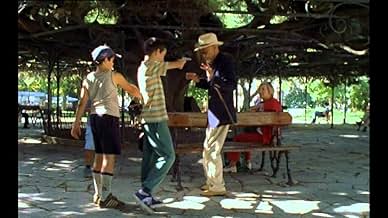João Vuvu, lives alone in a house that requires regeneration but due to being alone he is unable to do the work. On his son's release from prison and João's ensuing deception triggers a seri... Read allJoão Vuvu, lives alone in a house that requires regeneration but due to being alone he is unable to do the work. On his son's release from prison and João's ensuing deception triggers a series of somber events.João Vuvu, lives alone in a house that requires regeneration but due to being alone he is unable to do the work. On his son's release from prison and João's ensuing deception triggers a series of somber events.
- Director
- Writer
- Stars
- Awards
- 1 win total
Ligia Soares
- Narcisa the Antigona
- (as Lígia Soares)
Suzana Borges
- Hortênsia Vuvu
- (as Susana Borges)
- Director
- Writer
- All cast & crew
- Production, box office & more at IMDbPro
6.8807
1
2
3
4
5
6
7
8
9
10
Featured reviews
A Farewell to life itself
João César Monteiro, as always, in all is movies, showed a great disregard for conventions. Branca De Neve was a good example of that, Vai e Vem is also a good example of that.
Considered a madman by some and a fraud by others, is attempts to create movies that were at the same time groundbreaking and interesting were always misunderstood.
One of the greatest and most underrated Portuguese Directors of all time, no doubt about that.
Now one thing is, if you are not from Lisbon, or if you never visited Lisbon, you won't ever understand this movie. Because this lives out from the feeling that Lisboa is... I see this as an ode to the things that João Cesar Monteiro found dearest to him. Almost a farewell to life itself, and since this was Monteiro's last film, this is revealed to be true.
The last shot of the movie is the strangest thing I've seen ever in cinema. And you can take many conclusions out of it. Maybe he's trying to invert the papers, watching the spectators as they are watching him. Saying goodbye to the people that admired is work for decades.
Just like all the good things, you need to have a developed sense of inner-depth, to stomach this. Or else you're just going to quit after the first 2 minutes.
This is a unique film-maker, this is a unique film. If you don't appreciate you can always go watch, Scary Movie or some Meg Ryan movie. There's no problem with that.
Considered a madman by some and a fraud by others, is attempts to create movies that were at the same time groundbreaking and interesting were always misunderstood.
One of the greatest and most underrated Portuguese Directors of all time, no doubt about that.
Now one thing is, if you are not from Lisbon, or if you never visited Lisbon, you won't ever understand this movie. Because this lives out from the feeling that Lisboa is... I see this as an ode to the things that João Cesar Monteiro found dearest to him. Almost a farewell to life itself, and since this was Monteiro's last film, this is revealed to be true.
The last shot of the movie is the strangest thing I've seen ever in cinema. And you can take many conclusions out of it. Maybe he's trying to invert the papers, watching the spectators as they are watching him. Saying goodbye to the people that admired is work for decades.
Just like all the good things, you need to have a developed sense of inner-depth, to stomach this. Or else you're just going to quit after the first 2 minutes.
This is a unique film-maker, this is a unique film. If you don't appreciate you can always go watch, Scary Movie or some Meg Ryan movie. There's no problem with that.
Great movie-legacy
Amazing movie. It flows in a peculiar way. There are, from the very start of the movie, shots of him going about his daily life and you have the opportunity to see glimpses of Lisbon through these commonplace trips. The movie is sprinkled with bits of humor here and there but what really makes the movie is the sheer atmosphere of it. Even more than in other movies of his, there is a very enthralling meditative aspect to it. It is more of an inner voyage that only Monteiro would have been able to depict. You will certainly love it. Just don't expect mainstream Hollywood nonsense; this is a different universe altogether.
Unique! It's life! (possible spoilers, but I don't think so...)
More than the fact that this is a filmed testament from the dying director, this movie is a lesson of life. Life and cinema showed by someone who knew both very well. It's not a lesson of moral, things are sometimes weird, so this is a complete, pertinent, not hiding anything, and leading us to all kind of enjoyment. Pleasure and contemplation are always showed with a kind of nostalgia. Also, some plans are really interesting to watch and shows a way of filming, and of seeing life very difficult to show (except in painting). Playing with different factors, (rhythm, time, some objects) it's showing this Beyond all objectivity, or with an objectivity beyond objects... Monteiro is playing with our senses...
I agree it can be difficult to watch, because it's long, slow, without a lot of cuts, neither a lot of movements, everything is done with long plans. But all that is the rhythm of an old guy watching life, and having his last pleasures, and taking time to have it. It's an ode to life in all its ways. I've never written any comments on this sites (only on message boards) but I had to write something about this one. This movie is really special and intense, (and in a soft way, what is strange...).
Until the last plan which put the character, the director, and us to eternity... (I won't say more about this plan, but it has to be seen...)
I agree it can be difficult to watch, because it's long, slow, without a lot of cuts, neither a lot of movements, everything is done with long plans. But all that is the rhythm of an old guy watching life, and having his last pleasures, and taking time to have it. It's an ode to life in all its ways. I've never written any comments on this sites (only on message boards) but I had to write something about this one. This movie is really special and intense, (and in a soft way, what is strange...).
Until the last plan which put the character, the director, and us to eternity... (I won't say more about this plan, but it has to be seen...)
monumentally boring and painfully long
This movie is a complete waste of time. The whole thing consists of endless static shots of the writer/director/star, Monteiro, spouting witty sounding or profound sounding gibberish.
Every now and then Monteiro minces around, quasi-adorably, like a wizened little Portuguese Nosferatu.
To sustain audience interest and to presumably show what exquisite taste he has, Monteiro places a young nubile Latina hottie in the shot, and allows her to listen in rapt attention while he spouts off endlessly. All I can say is, I certainly hope she was paid well for what must surely have been the sheerest torture.
The only redeeming qualities to this film were a couple nice musical numbers on the soundtrack and the beautiful outside location shots of Lisbon.
I've seen one other of Monteiro's movies, "God's Comedy", and that had similar problems, but not as bad as "Vai E Vem".
Much is made of the fact that this was Monteiro's last film before he died in 2003. It seems pretty clear from the hugely self absorbed and self indulgent character of this film that it constitutes more of a curse than a blessing on the world he was leaving behind.
Every now and then Monteiro minces around, quasi-adorably, like a wizened little Portuguese Nosferatu.
To sustain audience interest and to presumably show what exquisite taste he has, Monteiro places a young nubile Latina hottie in the shot, and allows her to listen in rapt attention while he spouts off endlessly. All I can say is, I certainly hope she was paid well for what must surely have been the sheerest torture.
The only redeeming qualities to this film were a couple nice musical numbers on the soundtrack and the beautiful outside location shots of Lisbon.
I've seen one other of Monteiro's movies, "God's Comedy", and that had similar problems, but not as bad as "Vai E Vem".
Much is made of the fact that this was Monteiro's last film before he died in 2003. It seems pretty clear from the hugely self absorbed and self indulgent character of this film that it constitutes more of a curse than a blessing on the world he was leaving behind.
difficult to watch
Great were my expectations when I went to watch this film, because the Portuguese film critics were writing wonderful things about it. And how disappointed did I get! Sixty six shots in three hours and and nothing new. The film is nothing but an old man's fantasizing with young servants.
Monteiro has always had a very special approach to filmmaking, and he has his place in Portuguese film history, but that doesn't make this movie any better. What a pity.
Monteiro has always had a very special approach to filmmaking, and he has his place in Portuguese film history, but that doesn't make this movie any better. What a pity.
Did you know
- TriviaThe on-screen title is Vai-E-Vem, which was the pre-release title. After the film negative editing was complete, the director decided to change the title to Vai e Vem, and this is the registered title, and the promotional Portuguese title used by the Distributor company.
- GoofsWhen speaking with policewoman Bárbara, João smashes and throws an empty pack of cigarettes to the floor, and it rolls under the table. After opening the door to let Jorge in, João returns to the table starting a new cigarette and there is no empty pack under it.
- ConnectionsReferences Gone with the Wind (1939)
- SoundtracksBella Ciao
Written by Mondine
Details
- Release date
- Countries of origin
- Official site
- Languages
- Also known as
- Come and Go
- Filming locations
- Production companies
- See more company credits at IMDbPro
Box office
- Gross worldwide
- $33,429
- Runtime
- 2h 55m(175 min)
- Color
- Sound mix
- Aspect ratio
- 1.66 : 1
Contribute to this page
Suggest an edit or add missing content





























